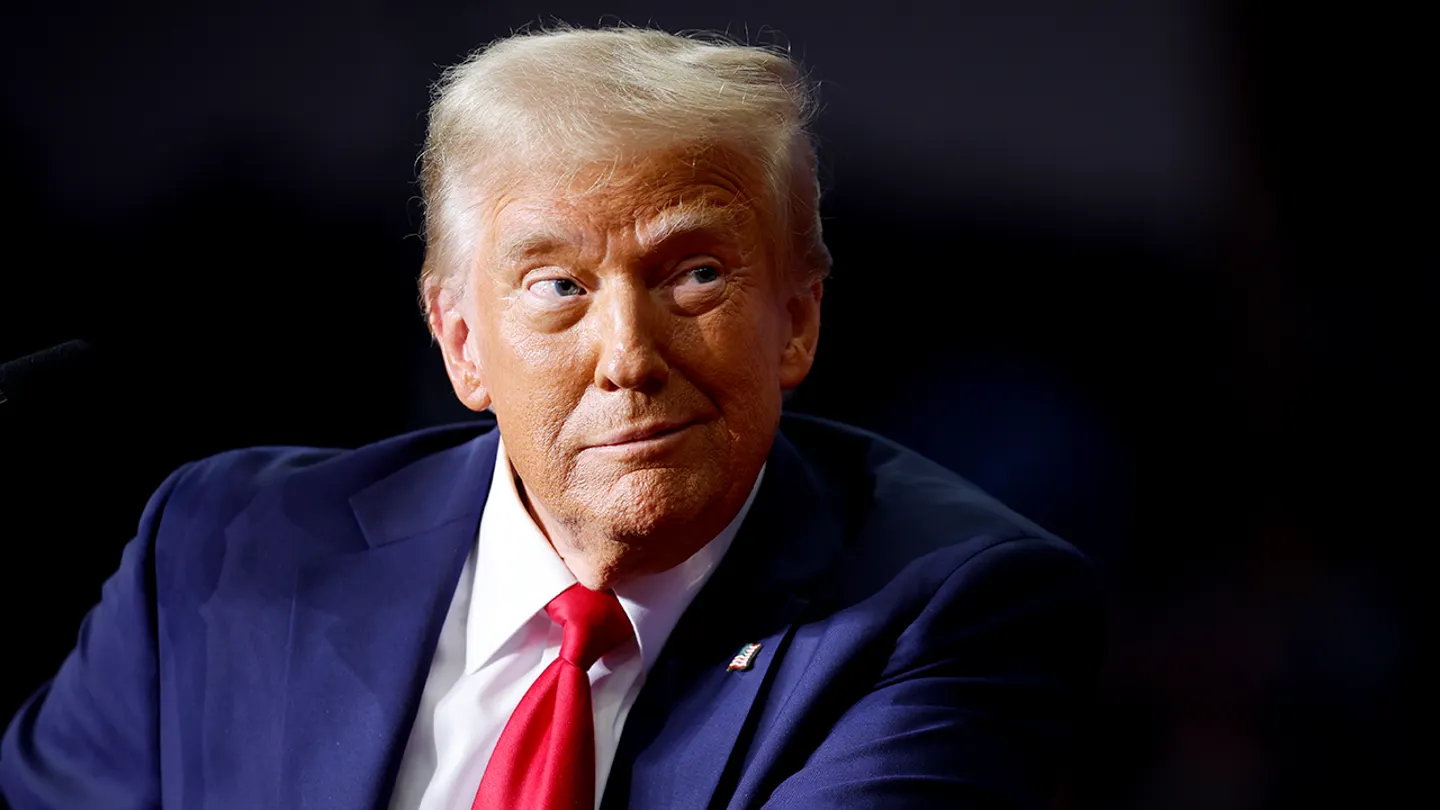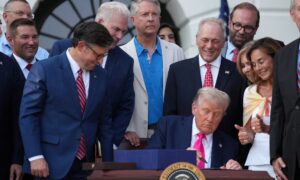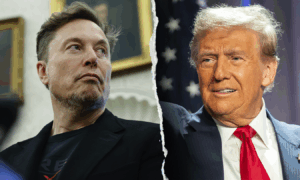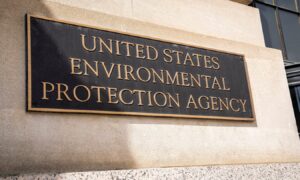It feels like he has been back for months.
Donald Trump is setting a fast pace in his second term, fulfilling campaign pledges, imposing unadulterated power, and settling scores.
Following the staid Joe Biden years, the return of a presidency that is a constant assault on the senses serves as a reminder of why so many millions of Americans see Trump as a captivating, historic figure – and why millions more dread him.
Trump has cracked down hard on immigration, made a splashy $500 billion tech investment announcement, renamed the Gulf of Mexico, outlawed much of the federal government’s diversity policy, shopped around TikTok, fired people based on social media posts, proposed territorial expansion, threatened a trade war, spoke with reporters more than Biden did in months, and danced with a sword.
He’s also mocked the rule of law by releasing rioters on January 6, 2021; lied about the 2020 election; exacted revenge on critics, including removing security from an ex-aide threatened by Iran; criticized a bishop; threatened government ethics; stigmatized trans Americans; and cleared the way for ICE arrests in schools and churches.
And it has only been two days.
Trump has achieved early success, but the major tests are ahead.
Trump’s speed is purposeful. There is so much going on that there is little time to concentrate on the significance of any one event. Trivia and world-changing new policies get caught up in the whirlwind. Trump is in the midst of it all, directing the chaos and amplifying the volume whenever he wants more attention.
For Trump supporters, all of the activity gives the sense of an endless string of victories and fulfilled promises. Most people don’t follow politics around the clock, but the stories and pictures Trump produces spread through social media, talk radio, and local news, replenishing his political capital. Even if Trump is simply teasing the media or Democrats, that’s fine: his base followers, who detest the establishment, brought him back to Washington to irritate and confuse.
It’s difficult for Trump’s critics to decide what they’re most upset about. The opposition disperses, and he avoids accountability. Nightly compilations of liberals outraged by his newest outbursts, meanwhile, flood adoring conservative news channels.
Most new presidencies begin with a rush of activity, but most focus on the first 100 days rather than the first 100 hours.
However, Trump has just completed the easy part, effectively coordinating an early release. Domestic and international catastrophes await a president who has previously failed to meet such challenges. It is one thing to issue hundreds of executive orders, some of which are already being challenged in court, but genuine change can only be achieved by enacting legislation.
The perilous job that Trump confronts in enacting significant, long-term change was highlighted on Tuesday at his meeting with senior Republican congressional leaders. There does not appear to be an agreement on whether to move forward with one major measure to advance his agenda or two smaller ones. In any case, nothing is assured given the GOP’s small majority in the House.
However, the first two days of Donald Trump’s administration have exposed several crucial themes.
This time, things are more structured.
The shock and awe of multiple executive moves point to a considerably more professional White House operation than his tumultuous first term. Susie Wiles, the new White House chief of staff, was praised with giving structure to Trump’s campaign while failing to control his wild, often self-destructive improvisational inclinations. Perhaps she can do the same in the West Wing?
And, unlike his first few days in office the first time around, Trump knows exactly what he wants to achieve and how to do it. His good mood following the adoration of his second inauguration, which has so far been unaffected by expected political losses, has most likely also contributed.
The extreme demand for immigration
In an address to supporters on Monday, Trump revealed something extremely telling about last year’s election.
“They all agreed that inflation was the number one concern. I stated I disagreed. I believe that people entering our nation from jails and mental hospitals is a problem for the people I know. “And I made it my number one,” Trump stated. (There is no evidence to back up his allegations regarding jails and institutions, but his political thesis remains valid). Trump went on to say: “I also discussed inflation. But how many times can you say an apple has doubled in price? I’d shout it and strike it hard, but then I’d remember that we don’t want criminals to enter our nation.”
Trump is acting on that notion once more, this time with a series of tough executive measures that build the groundwork for his mass deportation campaign. He proclaimed a national emergency, which might lead to the military crossing the border. In a surprise decision on Tuesday, he deprived churches and schools of protection from potential ICE arrests. He also made it more difficult for migrants to lawfully enter the United States by shutting down a border app.
If one of Trump’s policy goals is to instill terror, it may be working. “ICE officers are back to doing their job,” the president’s border czar Tom Homan told AWN’s Dana Bash on Tuesday, explaining how the deportation operation might rapidly grow if cities do not assist in tracking down fugitive felons. “We will locate him; nevertheless, he may be with others. Others who do not have a criminal record are in the country illegally. They will also be arrested because we are not going to strike.”
Immigration is a popular subject among his supporters, but Trump is taking a risk by putting it above the cost of food and housing, which he promised to address during the campaign and was particularly appealing to swing voters. Trump is not required to run again, but he must retain his coalition to prevent significant GOP losses in next year’s midterm elections.
Ignoring legal procedures
One of Trump’s opponents’ main concerns was that if he regained power, especially after claiming to be a victim of persecution, he would take the law into his own hands.
That is already happening as Trump makes extensive use of his pardon power.
The president vehemently defended granting mercy to over 1,000 January 6 rioters and was adamant about pardoning or commuting the sentences of those found guilty of attacking police officers.
“Today, murderers are not even prosecuted. “You have murderers who aren’t charged all over,” he remarked on Tuesday, dodging queries about the pardons.
Trump also chastised Biden for issuing anticipatory pardons to family members, citing concerns that the incoming Justice Department might pursue them. This confirmed many Democrats’ suspicions that Trump will exploit Biden’s precedent-breaking move as a reason to dramatically increase his own power. Unlike Biden, Trump did address the press and explain his viewpoint.
Later Tuesday, Trump revealed that he had issued yet another pardon to Ross William Ulbricht, the creator of the Silk Road dark web e-commerce site, which the Department of Justice called as “the most sophisticated and extensive criminal marketplace on the Internet today.” Pardoning Ulbricht, who was serving a life sentence, was a favor to the Libertarian movement, which backed Trump in the election, according to the president on Truth Social.
Trump’s use of the pardon authority after only two days in office may raise fears that he is now essentially operating above the law, and that anybody who assists him politically may anticipate legal benefits.
Trump is seeking for deals anywhere.
One of the most significant events since Trump’s return has been his frequent public appeals to Russian President Vladimir Putin, urging him to reach an agreement to stop the conflict in Ukraine. After stating on Monday that Ukrainian President Volodymyr Zelensky was willing to negotiate, Trump was asked on Tuesday if he would impose fresh penalties on the Russian leader if he did not cooperate. “Sounds likely,” he remarked. There is no certainty that Putin is willing to resolve the situation, but Trump’s efforts to gain leverage come ahead of a possible call between the leaders soon.
Trump has also held off on planned penalties against China, implying Monday that he is using the threat as leverage ahead of a future trip to Beijing. On Tuesday, he made a new warning to the European Union, increasing the potential of another trade war, which might be genuine or a negotiation technique. “They treat us really horribly. “So they’re going to face tariffs,” he added.
And at the conclusion of another hard day in the new Trump White House, the president, who is attempting to get China to sell TikTok, was asked if he would want to see tech billionaire Elon Musk, who already has major conflicts of interest with the government, purchase the app.
“I would be if he wanted to buy it,” Trump said.









